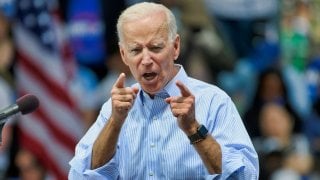Bidenomics Could Destroy Joe Biden (Or Keep Him in the White House)
According to the Joe Biden White House, their highly touted economic plan, dubbed ‘Bidenomics,’ is working. Indeed, the success or failure of this plan could mean Biden win in November or not.
According to the Biden White House, their highly touted economic plan, dubbed ‘Bidenomics,’ is working. “President Biden and Vice president Harris came into office determined to rebuild our economy from the middle out and the bottom up, not the top down – and that strategy is working,” the official White House website stated. But what exactly is Bidenomics? And is it actually working?
What is Bidenomics?
In the White House’s own words, Bidenomics is an effort to “move beyond…failed trickle-down policies,” an economic plan with “three key pillars.” The first pillar of Bidenomics is “making smart public investments in America,” which holds that “targeted public investment can attract more private sector investment.” Bidenomics intends to boost public investment as a share of the economy – which has fallen to about three percent (down from seven percent in the 1960s.) Public investment is tailored towards rebuilding infrastructure (“the necessary foundation for durable and shared economic growth”), such as roads, bridges, high-speed internet, ports, and airports. Public investment also calls for spending in industries “critical to our national security and economic security,” i.e., domestically made semiconductors.
The second pillar of Bidenomics is “empowering and educating workers to grow the middle class,” which calls for what’d you think: creating working class jobs, and to that end, investing in apprenticeships and career technical education programs. The end result, the administration hopes, will be low unemployment and high wages.
The third pillar of Bidenomics is “promoting competition to lower costs and help entrepreneurs and small businesses thrive.” Basically, the third pillar means to address the monopolization that has stifled the US economy during the 21st century. By promoting competition, the Biden administration means to generate “lower costs for consumers and higher ages for workers.” The most obvious example relates to efforts to lower prescription drug prices.
So, is it all working?
Is Bidenomics working?
Whether Bidenomics is working or not seems to come down to who you ask. Robert Reich argued that Bidenomics is “turning out to be the most successful set of economic policies the United States has witnessed in a half-century.”
“New economic data last week showed that inflation cooled to 3% in June, down from over 9% last year, and close to the Fed’s goal of 2%. And as inflation has subsided, real wages – that is, what paychecks will buy – have finally risen,” Reich wrote for The Guardian last year.
Still, others argue that Bidenomics is leaving working-class Americans behind.
“Data released late last month show food insecurity at its highest level since Biden took office, and average financial hardship in 2023 is worse than it was over the last three years,” The Lever reported late last year. “In other words, “Bidenomics,” the president’s economic plan to grow the economy “from the middle out and the bottom up,” has been accompanied by a humanitarian crisis.” That article continues to blame Democrats for failing to make COVID-era aid programs permanent.
Only about one-third of Americans approve of Biden’s economic guidance. True, Biden’s contemporary hyper partisanship could be suppressing Biden’s economic approval rating. But the fact that millions of Americans are reporting financial hardship and food insecurity no doubt factors in Biden’s low economic approval rating. If people are hungry and broke they’re not going to approve of the economy – no matter who is running it.
Biden will need to convince Americans that his three-tiered economic plan is working if he wants to be reelected to a second term.
About the Author
Harrison Kass is the Senior Editor and writer for National Interest. An attorney, pilot, guitarist, and minor pro hockey player, Harrison joined the US Air Force as a Pilot Trainee but was medically discharged. Harrison holds a BA from Lake Forest College, a JD from the University of Oregon, and an MA from New York University. Harrison listens to Dokken.


